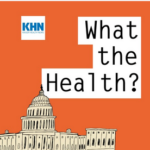Reprinted with permission from Kaiser Health News, from a podcast that aired Oct. 22, 2020:
For the first time in a long time, there is some good news about the coronavirus pandemic: Although cases continue to climb, fewer people seem to be dying. And there are fewer cases than expected among younger pupils in schools with in-person learning. But the bad news continues as well — including a push for “herd immunity” that could result in the deaths of millions of Americans.
Meanwhile, the Trump administration is doubling down on efforts to allow states to require certain people with low incomes to prove they work, go to school or perform community service in order to keep their Medicaid health benefits. The administration is appealing a federal appeals court ruling to the Supreme Court and just granted Georgia the right to impose a work requirement.
Among the takeaways from this week’s podcast:
- Opinions seem to be slowly shifting on opening schools around the country. As fall approached, many people were hesitant to send their children back to school because they feared a resurgence of coronavirus infections, but early experiences seem to show that there has been little transmission among young kids in classrooms.
- Even with good results in those school districts that have reopened, however, the debate about whether schools should be conducting in-person learning is quite polarized. President Donald Trump repeatedly calls for all schools to resume, while groups, such as unions representing teachers and other employees, are more likely to be calling for continued online learning.
- California, which had a strong resurgence of the virus during the summer, is seeing signs of success in fighting back. The state has been among the most aggressive in shutting down normal activities to reduce case levels. It devised a county-specific method to determine closures, restrictions and reopenings — and it appears to be working.
- A proposal by some researchers to move the country toward a “herd immunity” plan, in which officials would expect the virus to spread among the general population while also trying to protect the most vulnerable — such as people living in nursing homes — is gaining support among some of Trump’s advisers. Public health advocates are raising alarms because it would likely lead to hundreds of thousands more deaths. They also fear the administration’s focus on restoring normalcy would by default move in this direction.
- Federal researchers this week announced that nearly 300,000 excess deaths have been recorded this year and much of it is attributed to COVID-19 or the lack of other health care by people who could not or did not seek treatments because they were frightened by the pandemic.
Podcast was hosted by Julie Rovner of Kaiser Health News with Margot Sanger-Katz of The New York Times, Paige Winfield Cunningham of The Washington Post and Alice Miranda Ollstein of Politico.
